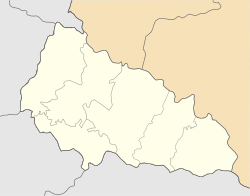Dubove (Ukrainian: Дубове; Hungarian: Dombó; Romanian: Delureni; Russian: Дубовое, romanized: Dubovoye; Slovak: Dubové; Yiddish: דיבעווע) is a rural settlement situated in the Carpathian Mountains in Tiachiv Raion, Zakarpattia Oblast, western Ukraine. While officially designated as an urban-type settlement, Dubove's character and composition more closely resembles that of a village. Population: 9,848 (2022 estimate).[1]
Dubove
Дубове Dombó • Дубовое | |
|---|---|
 The mountain village of Dubove | |
| Coordinates: 48°11′10″N 23°53′02″E / 48.18611°N 23.88389°E | |
| Country | |
| Oblast | |
| Raion | Tiachiv Raion |
| Elevation | 411 m (1,348 ft) |
| Population | |
| • Total | 9,848 (2022 estimate)[1] |
| Time zone | UTC+2 (EET) |
| • Summer (DST) | UTC+3 (EEST) |
| Postal code | 90531 |
| Area code | +380 3134 |
| KOATUU | 2123656200 |
| KATOTTH | UA21060070010074038 |
 | |
History
editThe area once known as Subcarpathia, which includes present-day Dubove (originally settled as Dombó), was part of the Kingdom of Hungary from the 10th century until 1919. Located in the county of Máramaros, Dombo gained prominence in 1755 when it became the site of the district's forestry office, which drew skilled lumberjacks and their families from Bohemia. Following the end of World War I in 1919, Subcarpathia, including Dombo, was annexed by the newly created Czechoslovak Republic and was given its current name, Dubove, a derivative of the Slavic word for oak tree (дуб, dub).
During World War II, Dubove was occupied by pro-Nazi Hungary. In 1930, 706 (or nearly 16%) of Dubove's 4,416 inhabitants were Jewish.[2] But by the end of World War II, virtually all of the Jews had been exterminated. The Red Army occupied Dubove in 1945 and the village was officially incorporated into the Soviet Union the following year.
In 1969, Dubove became home to a major Soviet plant, the Zakarpattia Helicopter Production Enterprise, creating an influx of new settlers and eventually raising the population of the village to over 10,000. By far the largest employer in the area, the factory was responsible for funding several projects in the village, including a stadium and technical school. But after the fall of the Soviet Union in 1991, the factory laid off roughly 5,000 workers and Dubove fell on hard times. Although the factory still creates helicopters today, most of its resources are devoted to producing commercial airplane seats, satellite antennas, and children's sleds.[3]
Until 26 January 2024, Dubove was designated urban-type settlement. On this day, a new law entered into force which abolished this status, and Dubove became a rural settlement.[4]
Geography
editDubove is located approximately halfway along the path of the River Teresva. It is regarded as the economic center of the tri-village area, which includes Ganichi and Kalyny.
Nearby villages
edit- Krasna - north 5.6 km
- Ust'-Chorna (Királymező in Hungarian and Königsfeld in German) - north 15 km
- Kalyny - south 3 km
- Ganichi - south 6 km
- Neresnytsya - southwest 10.4 km
Nearby towns
editEducation
editDubove has one technical school, one secondary school, three primary schools, and a music school.
Demographics
editThe majority of the inhabitants are Ukrainian, with Russian, Hungarian, and Roma minorities.
References
edit- ^ a b Чисельність наявного населення України на 1 січня 2022 [Number of Present Population of Ukraine, as of January 1, 2022] (PDF) (in Ukrainian and English). Kyiv: State Statistics Service of Ukraine. Archived (PDF) from the original on 4 July 2022.
- ^ "German Genealogy: Karpatho-Ukraine". www.genealogienetz.de.
- ^ "Iнвестицiйна картка". www.tpp.uzhgorod.ua.
- ^ "Что изменится в Украине с 1 января". glavnoe.in.ua (in Russian). 1 January 2024.



